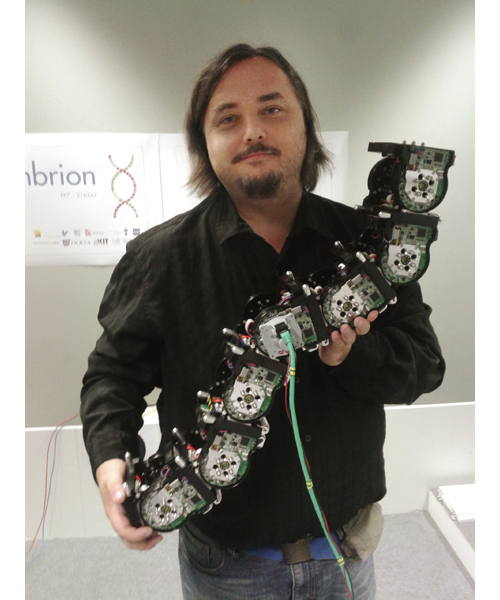![]()
Opening Talk: Wednesday, 23 April at 09:45
“Evolving bio-hybrid societies of animals and robots”
This talk will discuss computational devices (robots) that are used to trick animals to study their behaviors. He will show how modern computerized devices can take over the role of the scientist and act as their own experimenters by sneaking into animal societies. This way, bio‐mimicking machines take over an active role in natural societies, forming something novel: A bio‐hybrid society. Such a society is a new variant of the ”cyborgs" known from literature. Instead of exchanging body parts of a human, these machines replace parts of the society. Evolutionary computation and machine learning can allow these machines to adapt to their natural counterparts and learn over time to better integrate in their biohybrid societies. While this has occurred for over a decade with Google, Facebook and similar services in human society, it was only recently achieved with animals, unveiling to us the before unknown social languages of interaction of these animals.
 Thomas Schmickl (Master: Salzburg, Austria 1998; Ph.D.: Graz, Austria 2001; Habilitation: Graz, Austria 2012) is an Associate Professor at Karl-Franzens University, Graz, Austria, and a lecturer at the University for Applied Sciences in St. Pölten, Austria. He is the founder of the Artificial Life Lab Graz, an inter-disciplinary research lab researching swarm intelligence, biological self-organization, ecology, evolution, swarm robotics, modular robotics, and bio-inspired algorithms. He is a leading scientist in various international research projects such as I-Swarm, Symbrion, Replicator, CoCoRo & ASSISI. Prof. Schmickl researches and teaches ecological relationships among species, including mathematical modeling and simulation of ecosystems. He also researches evolutionary dynamics in ecosystems, information processing and collective computation in social insect colonies, and other dynamics in decentralized multi-component systems such as collective decision making, opinion polling, and collective homeostasis. In recent years Dr. Schmickl has supervised research grants of more than $4.3 million, and he has published in his scientific career more than seventy peer-reviewed articles in scientific journals and book series, as well as eleven peer-reviewed chapters in scientific books.
Thomas Schmickl (Master: Salzburg, Austria 1998; Ph.D.: Graz, Austria 2001; Habilitation: Graz, Austria 2012) is an Associate Professor at Karl-Franzens University, Graz, Austria, and a lecturer at the University for Applied Sciences in St. Pölten, Austria. He is the founder of the Artificial Life Lab Graz, an inter-disciplinary research lab researching swarm intelligence, biological self-organization, ecology, evolution, swarm robotics, modular robotics, and bio-inspired algorithms. He is a leading scientist in various international research projects such as I-Swarm, Symbrion, Replicator, CoCoRo & ASSISI. Prof. Schmickl researches and teaches ecological relationships among species, including mathematical modeling and simulation of ecosystems. He also researches evolutionary dynamics in ecosystems, information processing and collective computation in social insect colonies, and other dynamics in decentralized multi-component systems such as collective decision making, opinion polling, and collective homeostasis. In recent years Dr. Schmickl has supervised research grants of more than $4.3 million, and he has published in his scientific career more than seventy peer-reviewed articles in scientific journals and book series, as well as eleven peer-reviewed chapters in scientific books.
![]()
Wednesday, 23 April at 16:40
“From physical laws to biology: What is Life? An approximation from systems biology”
Physics, Chemistry, and, of course, Mathematics are all universal disciplines. They have a theoretical backbone that allows us to make predictions even for those scenarios that we have never visited. For example, we can predict the course of a given chemical reaction in Mars, provided we have the environmental conditions and parameters of the reactions. This is not the case of Biology. We do not have a general theory of biological systems and we do know that Biology is not universal. The only Biology we know is the one on the biosphere of planet Earth. But how long can we go in understanding the laws of Nature, the physical laws, that operate on biological systems to be able to build up theories, models and predictions? The revolution of molecular biology driven by the massive amount of data obtained by the high throughput techniques allows us to have a systemic view of many biological systems, including the living cell. In this presentation we are going to have a journey from the origin of life to the new revolutionary synthetic life using a systemic approach. The results and findings of the genomic revolution will also be introduced in the context the philosophical question of “what is life?”
 Federico Moran was appointed as Secretary General for Universities by the Ministry of Education, Culture and Sport (Spain) and since 2012 has been Full Professor (Catedrático) of Biochemistry and Molecular Biology, formerly at the University Complutense Madrid (UCM) Spain. Obtaining a PhD in Biochemistry from the University Complutense Madrid in 1982, he has developed his teaching activity in Biophysics, Bioinformatics, and Systems Biology. Postdoctoral research was undertaken at the department of “Physique-Chemie II” at the Universite Livre de Bruxelles, working on complex dynamics of biochemical reactions. Other post-doctoral stays include University California Irvine and University of Southern California. He is Deputy Director of the Spanish Institute for Bioinformatics (Technological Platform of the Public Fundation Genoma España and Instituto de Salud Carlos III, and is also a senior scientist of the Centro de Astrobiología, CAB (CSIC-INTA), associated to NASA Astrobiology Institute. He continues research collaboration with the Department of Chemistry, Stanford University (USA) since 1996. including the study of complex biochemical networks, molecular evolution, and origin of self-maintained proto-cells in the context of prebiotic evolution. Other areas of expertise are genetic algorithms and unsupervised neural networks.
Federico Moran was appointed as Secretary General for Universities by the Ministry of Education, Culture and Sport (Spain) and since 2012 has been Full Professor (Catedrático) of Biochemistry and Molecular Biology, formerly at the University Complutense Madrid (UCM) Spain. Obtaining a PhD in Biochemistry from the University Complutense Madrid in 1982, he has developed his teaching activity in Biophysics, Bioinformatics, and Systems Biology. Postdoctoral research was undertaken at the department of “Physique-Chemie II” at the Universite Livre de Bruxelles, working on complex dynamics of biochemical reactions. Other post-doctoral stays include University California Irvine and University of Southern California. He is Deputy Director of the Spanish Institute for Bioinformatics (Technological Platform of the Public Fundation Genoma España and Instituto de Salud Carlos III, and is also a senior scientist of the Centro de Astrobiología, CAB (CSIC-INTA), associated to NASA Astrobiology Institute. He continues research collaboration with the Department of Chemistry, Stanford University (USA) since 1996. including the study of complex biochemical networks, molecular evolution, and origin of self-maintained proto-cells in the context of prebiotic evolution. Other areas of expertise are genetic algorithms and unsupervised neural networks.
![]()
Professor Susan Stepney
Closing Talk: Friday, 25 April at 12:00 noon
“Challenges for Open Ended Evolution”
Open-ended evolution is a major goal of Artificial Life research. However, many in silico experiments in this area use implementations that are demonstrably closed. Here I will talk about requirements for OEE, discuss how biology seems to achieve this, and suggest ways forward for artificial systems.







